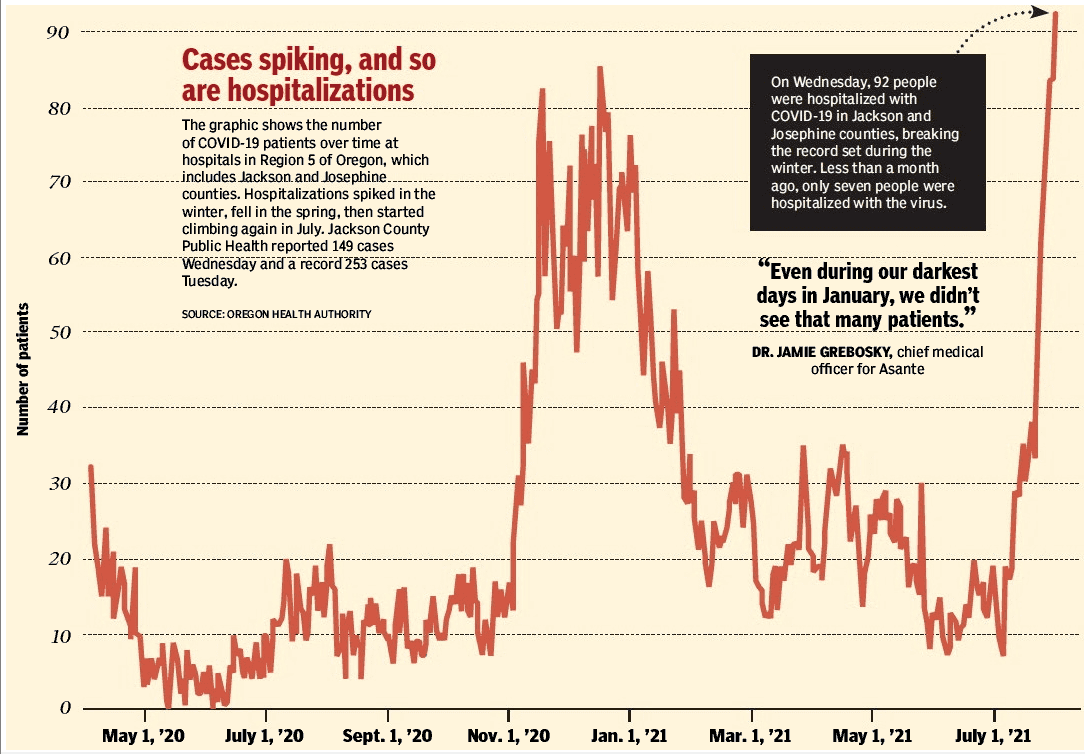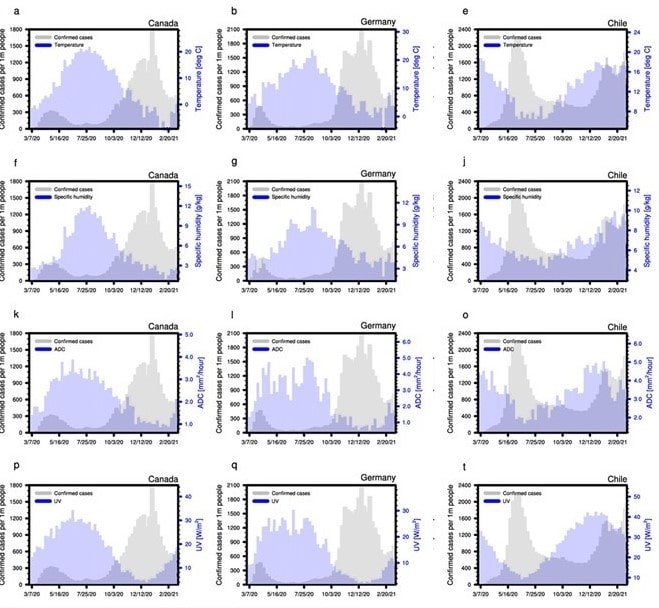Sick of it…or sick with it?
by Bob Buddemeier
Here we go again — masked, but not yet distanced or locked down.
To consider the future, look at what the Mail-Tribune told us (August 5) about the past and near-present.

COVID cycles tend to run on time scales of weeks — take a look at the smaller hills and valleys in the graph above. That means that if we are very lucky the current spike might be turning around by the end of August.
So what? The delta variant isn’t killing many vaccinated people. On the other hand it can be a pretty nasty disease even if non-fatal, and introducing it into a community rife with old people having multiple underlying conditions doesn’t seem like a good idea.
From the Mail-Tribune, August 7, p1 — “Breakthrough Cases on the Rise in State:”
In July, 91% of COVID-19 deaths in Oregon were among people who were unvaccinated or partially vaccinated, according to the report. That’s 50 of 55 deaths. [Note that 5, or 9%, were fully vaccinated. ] While the state didn’t share specific details for each of those cases, officials say of the 42 fully vaccinated people who’ve died in Oregon of COVID-19 since vaccinations began nearly eight months ago, the median age is 83. [Which is pretty close to the median age of RVM residents. How do you like that 9% chance?]
Does anyone else wonder what life might be like if we were to get a breakthrough cluster on campus?
But let’s look a little farther into the future, and check in on our friend, Mr. Science. Well, OK, Dr. Science. A very recent paper came up with some answers to a question of considerable interest — how do environmental conditions affect the spread of COVID?
The researchers looked at the relationship between environmental conditions and infections in 5 comparable settings — We are only going to look at the 3 temperate sites.
The conditions considered were temperature, humidity, ultraviolet radiation (UV), and something called air drying capacity (ADC). If you want to know about that last one, read the paper.
The figures below show COVID cases in gray and the environmental variable in blue for Canada, Germany, and Chile (remember that Chile is in the southern hemisphere, so its calendar is backwards). The result? All three show the big COVID occurrence in winter — and not just sort of; the relationships are strong and consistent.

Seasonal variation of COVID-19 prevalence and environmental variables. Seasonal variation of weekly COVID-19 prevalence alongside weekly (a–e) temperature, (f–j) specific humidity, (k–o) air drying capacity, and (p–t) ultraviolet radiation across COVID-19 hotspots, such as (a, f, k, and p) Canada in North America, (b, g, l, and q) Germany in Europe, and (e, j, o, and t) Chile in South America. GeoHealth, Volume: 5, Issue: 6, First published: 17 May 2021, DOI: (10.1029/2021GH000413)
Take a look at our neighbor, Canada. Cases are well on their way up by mid-October, with a December-January peak. Looks like we had better get to that herd immunity in two months.
We all need a little encouragement — will we get it from the uncertainties in our knowledge and predictions?
- We don’t know if the delta variant will act like the 2020 strains (it probably will).
- There may be other mutants playing in the game 3-4 months from now.
- We don’t really know how long the immunity lasts from vaccine or infection (that is, how many infectible people there will be 4 months from now).
- And the wild card — we don’t know what the regular (non-COVID) flu season will be like this year. COVID precautions probably suppressed it last year, but that’s less likely now. Will people get those flu shots? What strains will be active? Is it possible to get both diseases at the same time? If we go into a 2-disease outbreak, will precautions be based on one or the combination?
Several of the uncertainties could turn out on the positive (or at least not-too-negative) side. So are you encouraged? If so, congratulations, but don’t let it interfere with keeping precautions high and expectations no more than moderate.



Leave a Reply
Want to join the discussion?Feel free to contribute!